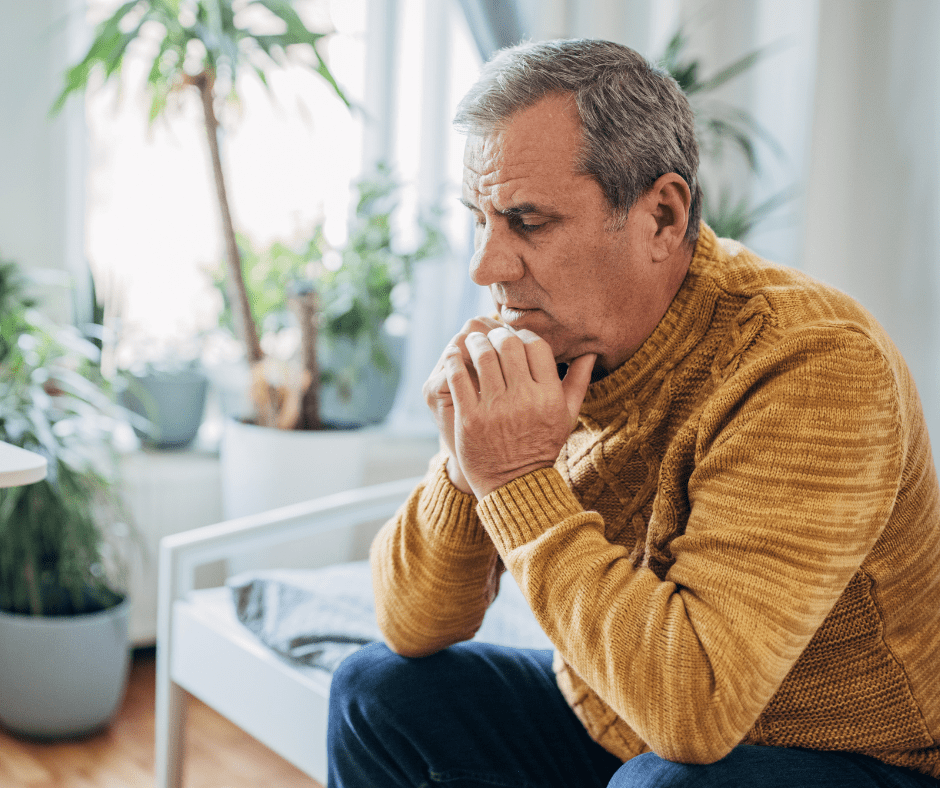It started with a sock drawer.
Samantha had been feeling on edge for months. Irritated by small things, easily overwhelmed, and always waiting for the next shoe to drop. Her husband, Marcus, tried to be supportive. But on a rainy Tuesday morning, as he searched through a jumbled drawer for a matching sock, he sighed in frustration. She snapped.
“If you just folded the laundry the way I asked…”
It spiraled. What started as a messy drawer became an argument about empathy, respect, and how neither of them felt heard.
Later that night, in silence, Samantha sat on the couch feeling anxious, ashamed, and out of ideas. She Googled, “effects of anxiety on relationships.“ What she found made her cry in relief and validation. The emotional weight of anxiety she was carrying wasn’t just hers. It was affecting her marriage, too, and it was reassuring to know that this happens for other couples.
If you’re living with anxiety or loving someone who is, this story might sound a little too familiar.
Let’s unpack what anxiety really does to a relationship, and more importantly, what you can do about it.
*Samantha and Marcus are a composite story based on common patterns I see in real couples, shared here with respect and confidentiality in mind.
The Hidden Effects of Anxiety on Relationships

A recent study followed 33 couples where one partner had anxiety. The results? On days when anxiety spiked, both partners reported lower relationship satisfaction. And the effects weren’t just how they felt; partner anxiety also affected how they related to each other. Partners became more withdrawn, less affectionate, and more prone to conflict when one or both were feeling anxious.
A recent study followed 33 couples where one partner had anxiety. The results? On days when anxiety spiked, both partners reported lower relationship satisfaction. And the effects weren’t just how they felt; partner anxiety also affected how they related to each other. Partners became more withdrawn, less affectionate, and more prone to conflict when one or both were feeling anxious.
Samantha started noticing that her need for control was actually a coping mechanism for her anxiety, and Marcus began to pull away, unsure how to help or respond.
Here are some subtle, daily signs that anxiety could be hurting your connection:
🔹 1. Constant Reassurance-Seeking
A spouse with anxiety repeatedly asks, “Do you still love me?” “Are you mad at me?” This can feel emotionally draining for both partners, creating a pattern of emotional dependency.
🔹 2. Avoidance of Conflict or Intimacy
When your partner has anxiety, they may fear confrontation so much that they shut down or shut you out, leading to emotional distance.
🔹 3. Control-Based Coping
To reduce their inner panic, a partner with anxiety might try to control external situations like the schedule, the house, and parenting, leaving the other partner feeling micromanaged or resentful.
🔹 4. Physical Symptoms That Impact Intimacy
Fatigue, muscle tension, and sleeplessness can affect sexual connection and affection.
🔹 5. Mood Swings That Disrupt the Peace
Mood volatility creates emotional whiplash in the relationship, making it hard to feel safe together.
Each of these may seem small in the moment, but over time, they erode affection and comfortability with one another, a foundation of a strong relationship.
Samantha started noticing that her need for control was actually a coping mechanism for her anxiety, and Marcus began to pull away, unsure how to help or respond.
Here are some subtle, daily signs that anxiety could be hurting your connection:
🔹 1. Constant Reassurance-Seeking
A spouse with anxiety repeatedly asks, “Do you still love me?” “Are you mad at me?” This can feel emotionally draining for both partners, creating a pattern of emotional dependency.
🔹 2. Avoidance of Conflict or Intimacy
When your partner has anxiety, they may fear confrontation so much that they shut down or shut you out, leading to emotional distance.
🔹 3. Control-Based Coping
To reduce their inner panic, a partner with anxiety might try to control external situations like the schedule, the house, and parenting, leaving the other partner feeling micromanaged or resentful.
🔹 4. Physical Symptoms That Impact Intimacy
Fatigue, muscle tension, and sleeplessness can affect sexual connection and affection.
🔹 5. Mood Swings That Disrupt the Peace
Mood volatility creates emotional whiplash in the relationship, making it hard to feel safe together.
Each of these may seem small in the moment, but over time, they erode affection and comfortability with one another, a foundation of a strong relationship.
Your Gentle Path to Thriving Together
Your Gentle Path to Thriving Together
Anxiety may feel overwhelming right now, but with the right tools and support, connection is possible. These are some of the ways I help couples move from anxious disconnection back to closeness:
- Couples Therapy: Here’s what we focus on:
- Communication strategies that de-escalate anxious conflict
- Emotional safety and trust
- Learning to co-regulate and soothe yourself and each other’s nervous systems
- Creating boundaries that protect both connection and individuality.
- Couples Retreat: Immersive retreats offer couples a transformative environment to practice deep connection, emotional safety, and resilience-building skills.
- Daily Tools: I’ll support you with communication exercises, emotion regulation techniques, mindfulness, and strategies for managing anxious triggers together.
Whether through weekly sessions or a weekend couples retreat, we take small, meaningful steps toward feeling seen, heard, and deeply connected again.
Is Anxiety Affecting Your Relationship?
1. How often does one partner seek reassurance about the other’s love or commitment?
2. Does anxiety lead you or your partner to withdraw or shut down?
3. Do you find yourselves needing to control daily routines "to avoid stress"?
4. Does anxiety lead to conflict or misunderstandings more than connection?
5. Have therapists or loved ones commented on an anxious pattern hurting your relationship?
Mostly As: Anxiety is likely taking a toll on your relationship. Couples therapy can offer relief by helping both of you understand how anxiety operates in your dynamic and teaching you tools to reduce conflict, increase empathy, and build emotional safety. Even deeply stuck patterns can begin to shift with the right support.
Mostly Bs: Warning signs are present. Some focused support could help. Couples therapy at this stage offers a chance to address early patterns before they become bigger problems. You can learn how to notice the signs of anxiety, co-regulate as a couple, and stay emotionally connected even when stress rises.
Mostly Cs: Your foundation is strong, so be attentive to subtle shifts. Even couples who are doing well benefit from preventative support. Therapy can help you strengthen your communication and stay emotionally attuned so that anxiety doesn’t sneak in and undo the connection you’ve built.
When You’re Tired of Trying So Hard

Maybe you’ve read the books. Tried the breathing exercises. Held your tongue when you wanted to shout. Or opened up when it felt scary, hoping they’d meet you halfway.
And still, here you are doing so much emotional heavy lifting just to keep the peace. Or maybe you’re the partner walking on eggshells, unsure how to help without making things worse.
The truth is, anxiety can make love feel like work, because your nervous system and your relationship are overloaded and under-supported.
You don’t have to keep carrying this alone.
Next Steps to Reduce Anxiety and Build Connection
🔹 1. Let’s Talk: Just the Two of You (and Me)
Sometimes the first step toward change isn’t a big one. It’s a quiet moment of saying, “We’re ready for more.”
If you’re curious about individual or couples therapy but not sure where to start, I offer a complimentary 15-minute consultation. No pressure, just a space to talk about what’s feeling hard, what’s working, and what’s possible. Think of it as a conversation starter with someone in your corner.
💬 You let me know what’s going on, and I’ll bring care, clarity, and next steps.
👉 Schedule your complimentary consultation here
🔹 2. Let Your Conversations Pull You Closer
If you’ve ever looked at your partner and thought, “I miss us,” the free 3-Day Couples Connection Challenge is for you. Each day gives you a fun, meaningful prompt to help you reconnect, not through big, heavy talks, but simple, heartfelt questions that bring out laughter, memories, and deeper understanding. It’s designed for couples who want to grow together, even when life is full and messy.
✨ One printable quiz a day.
✨ Just 10 minutes of connection.
✨ And maybe… your favorite conversation all week.
Join the challenge here for daily micro-practices to reconnect, communicate more clearly, and understand each other better, starting today.
🔹 3. Take what you’ve just read even deeper
Join the waitlist for Be Still, a 6-week group therapy experience where we’ll explore therapeutic tools to reduce anxiety and strengthen resilience. The skills are adapted to align with the Christian faith. Signing up means you’ll be the first to know when the next group opens. Click here to get on the waitlist. Space is limited to just 6 – 8 participants.
If it spoke to your experience, leave a comment to share your story or reflections, and let me know what kinds of topics you’d like to see more of. Your voice helps shape this space, and you never know who might feel a little less alone because you shared.




0 Comments